Lcd companion boards support (VKLCD50RTA & VKLCD70RT)
What is this ?
This is a demo program using Renesas RGA library & USB Camera to demonstrate VK-RZ/A1H's companion boards workability.
Supported companion Boards:
VKLCD50RTA
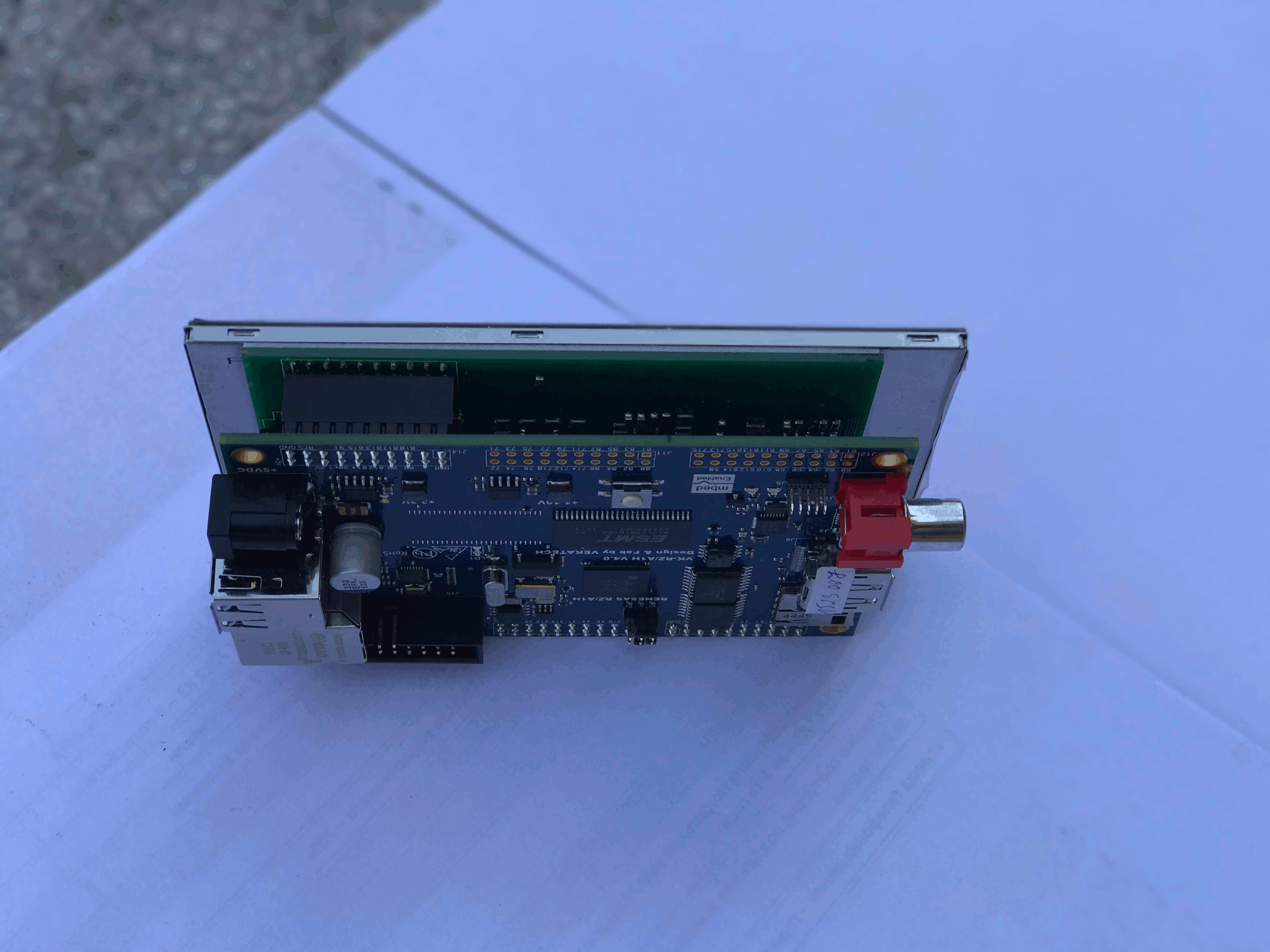
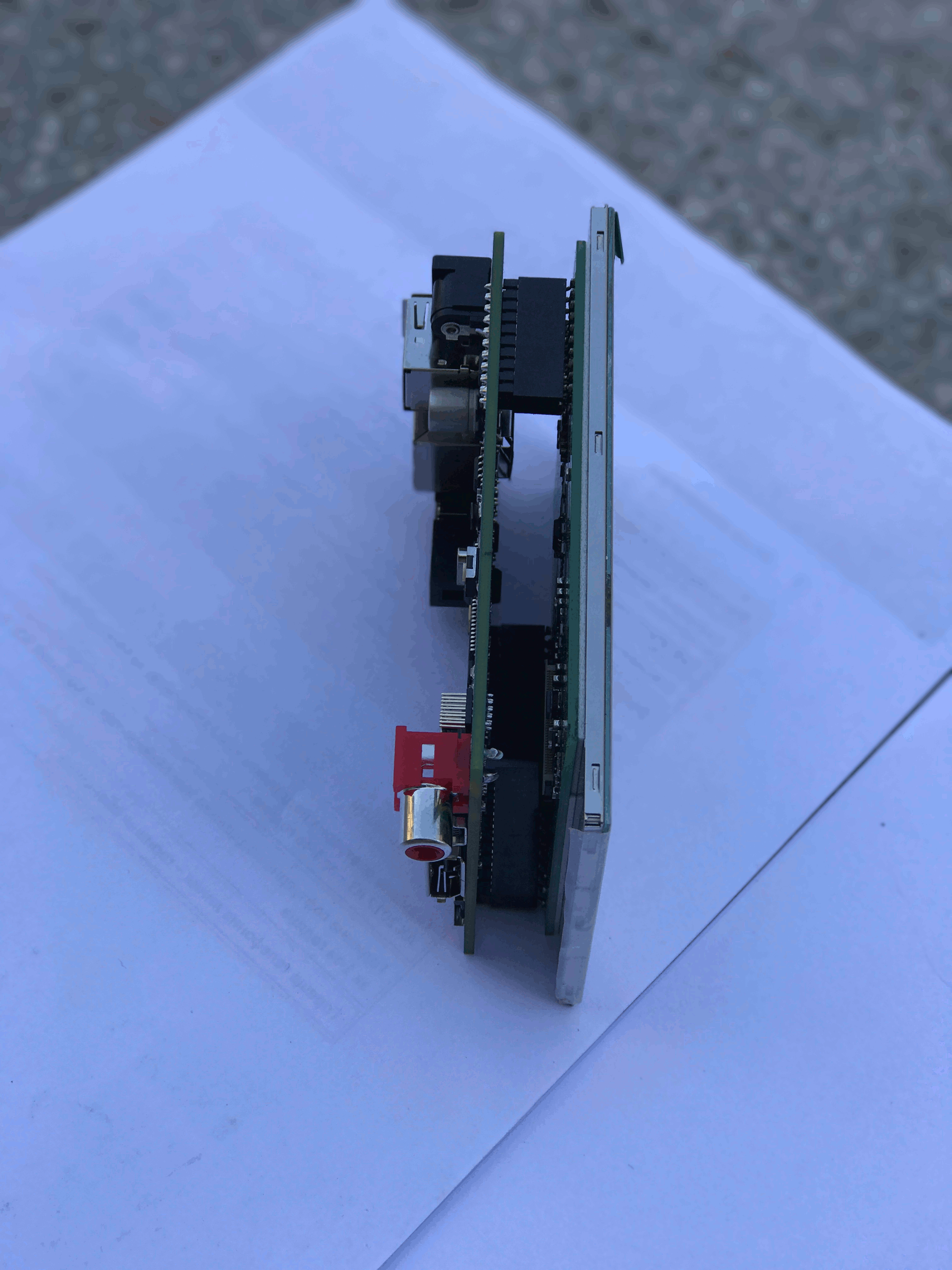
VKLCD70RT
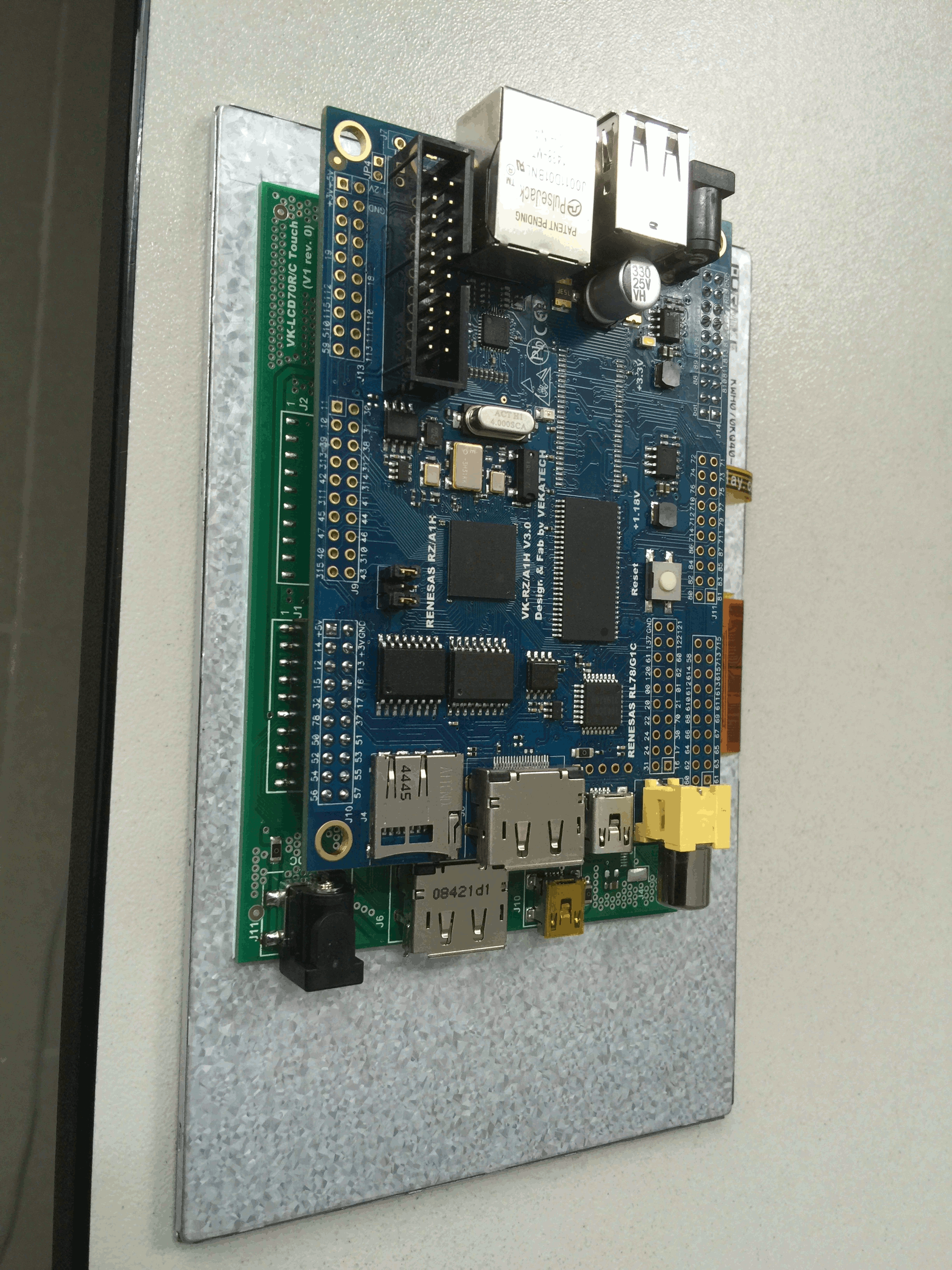
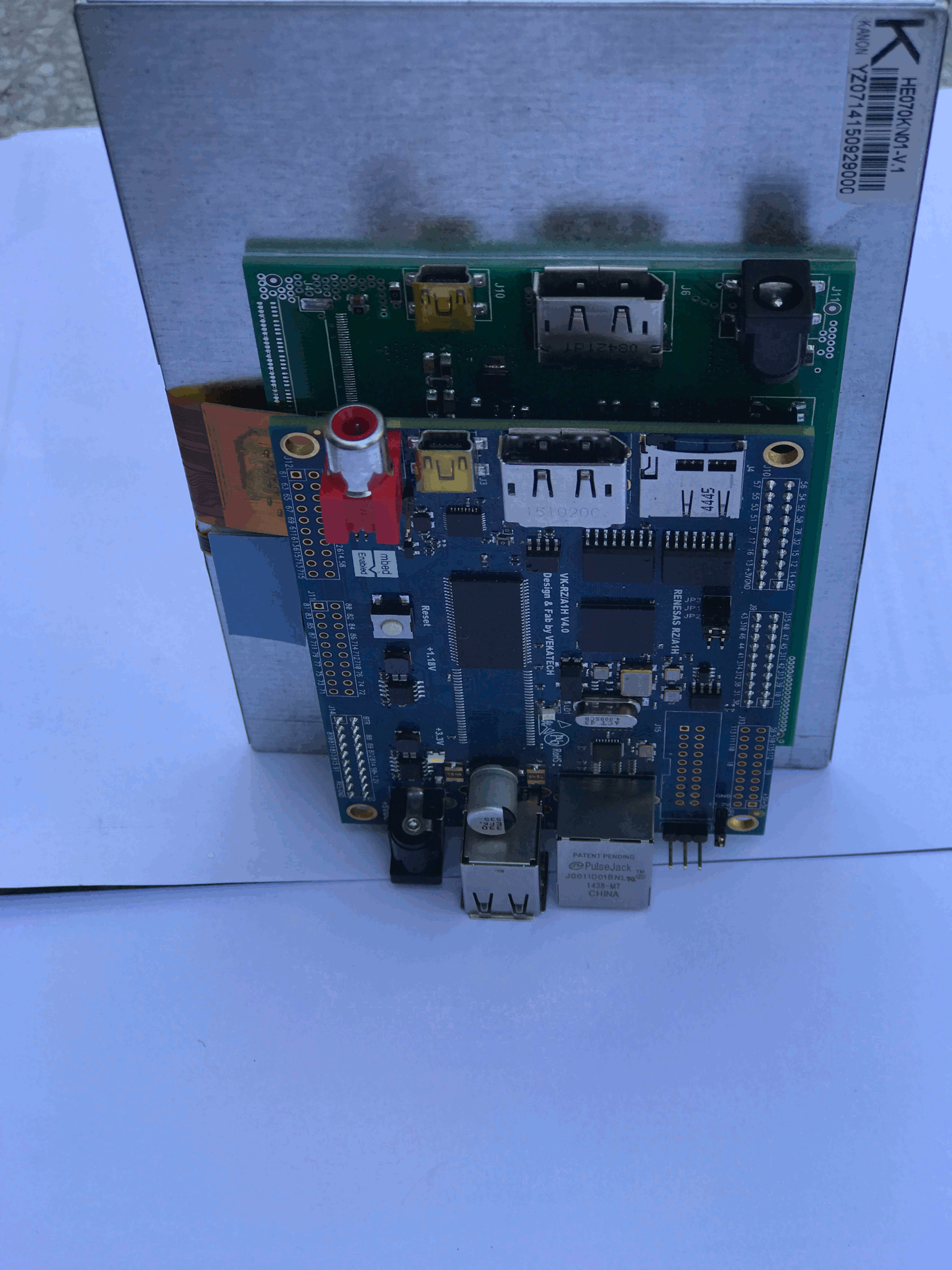
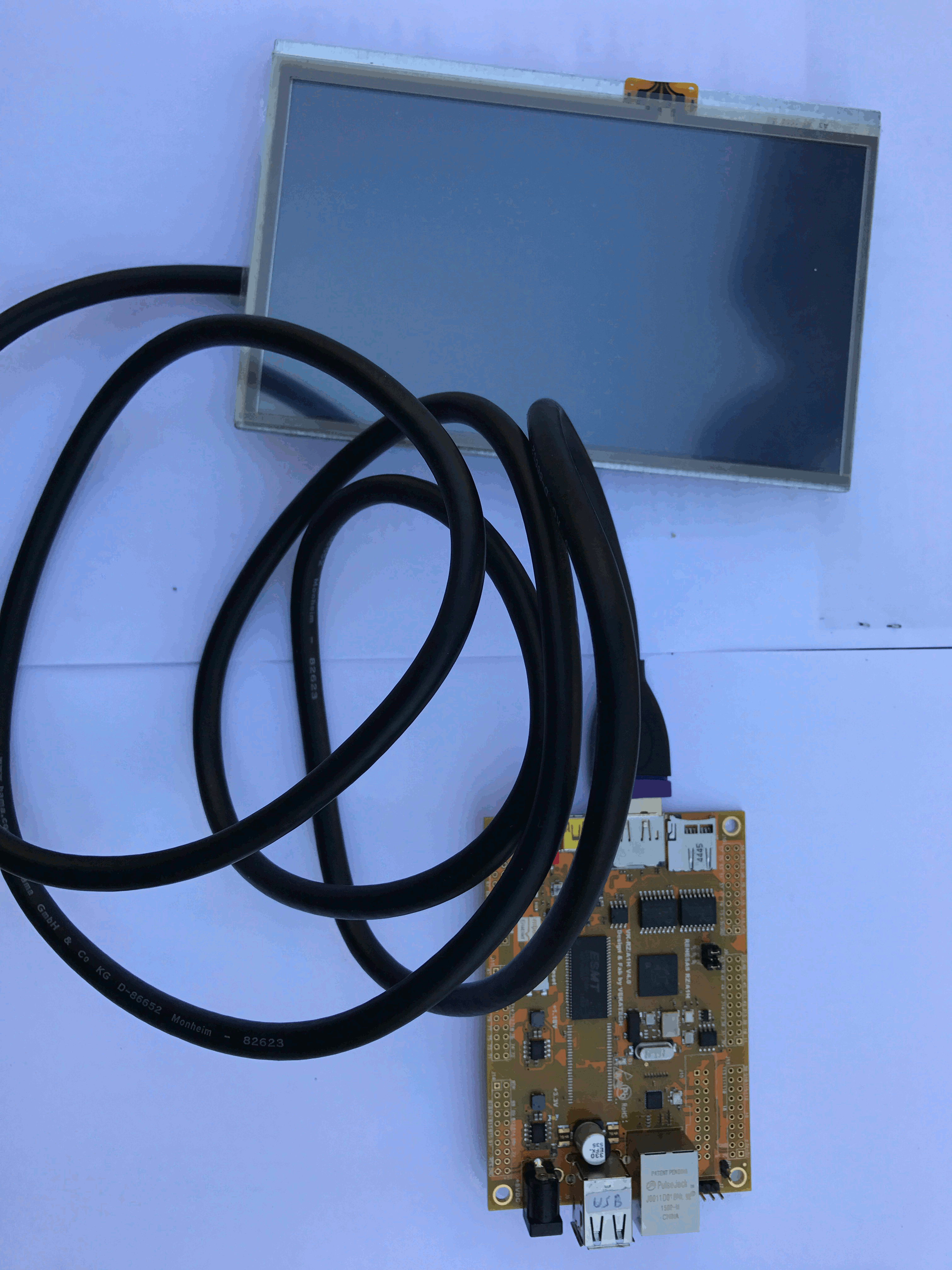
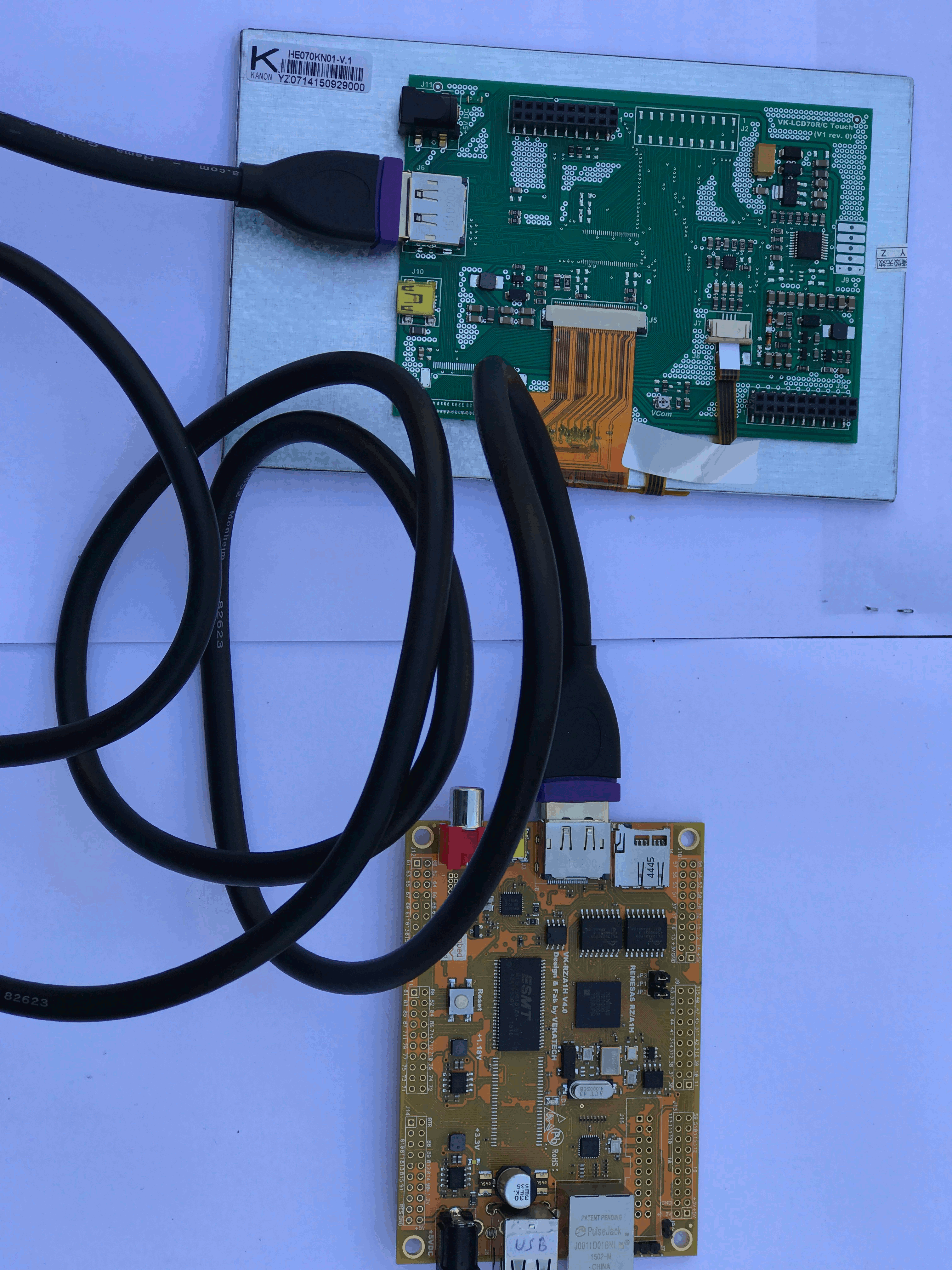
How to Configure ?
You can choose which display is installed by altering the lcd_panel.h file
Leave the active one & comment out the others:
#define LCD_VDC5_CH0_PANEL LCD_CH0_PANEL_VKLCD50RTA //#define LCD_VDC5_CH0_PANEL LCD_CH0_PANEL_VKLCD70RT
You can alter the whole demo with your pictures if you like:
How to compile ?
- The Demo can be compiled in 3 modes:
- I. Execution from the internal 10-MB on-chip SRAM.
- II. Execution from the on-board serial FALSH in dual (32-MB) mode.
- After import in the online compiler just leave only the VKRZA1H_DOUBLE.sct & delete all others linker files in the TOOLCHAIN_ARM_STD folder.
- Drag & drop the result binary in MBED disk, (previously inited in double flash mode)
- III. Execution from the on-board serial FALSH in single (16-MB) mode.
- After import in the online compiler just leave only the VKRZA1H_SINGLE.sct & delete all others linker files in the TOOLCHAIN_ARM_STD folder.
- Drag & drop the result binary in MBED disk, (previously inited in single flash mode )
Quick presentation:
Other demos ?
More demos you can find on our FTP
USB/USBHost/USBHost.cpp
- Committer:
- tvendov
- Date:
- 2017-02-16
- Revision:
- 0:6435b67ad23c
File content as of revision 0:6435b67ad23c:
/* mbed USBHost Library
* Copyright (c) 2006-2013 ARM Limited
*
* Licensed under the Apache License, Version 2.0 (the "License");
* you may not use this file except in compliance with the License.
* You may obtain a copy of the License at
*
* http://www.apache.org/licenses/LICENSE-2.0
*
* Unless required by applicable law or agreed to in writing, software
* distributed under the License is distributed on an "AS IS" BASIS,
* WITHOUT WARRANTIES OR CONDITIONS OF ANY KIND, either express or implied.
* See the License for the specific language governing permissions and
* limitations under the License.
*/
#include "USBHost.h"
#include "USBHostHub.h"
#if(1) /* Isochronous */
#include "USBIsochronous.h"
#endif
USBHost * USBHost::instHost = NULL;
#define DEVICE_CONNECTED_EVENT (1 << 0)
#define DEVICE_DISCONNECTED_EVENT (1 << 1)
#define TD_PROCESSED_EVENT (1 << 2)
#define MAX_TRY_ENUMERATE_HUB 3
#define MIN(a, b) ((a > b) ? b : a)
/**
* How interrupts are processed:
* - new device connected:
* - a message is queued in queue_usb_event with the id DEVICE_CONNECTED_EVENT
* - when the usb_thread receives the event, it:
* - resets the device
* - reads the device descriptor
* - sets the address of the device
* - if it is a hub, enumerates it
* - device disconnected:
* - a message is queued in queue_usb_event with the id DEVICE_DISCONNECTED_EVENT
* - when the usb_thread receives the event, it:
* - free the device and all its children (hub)
* - td processed
* - a message is queued in queue_usb_event with the id TD_PROCESSED_EVENT
* - when the usb_thread receives the event, it:
* - call the callback attached to the endpoint where the td is attached
*/
void USBHost::usb_process() {
bool controlListState;
bool bulkListState;
bool interruptListState;
USBEndpoint * ep;
uint8_t i, j, res, timeout_set_addr = 10;
uint8_t buf[8];
bool too_many_hub;
int idx;
#if DEBUG_TRANSFER
uint8_t * buf_transfer;
#endif
#if MAX_HUB_NB
uint8_t k;
#endif
while(1) {
osEvent evt = mail_usb_event.get();
if (evt.status == osEventMail) {
message_t * usb_msg = (message_t*)evt.value.p;
switch (usb_msg->event_id) {
// a new device has been connected
case DEVICE_CONNECTED_EVENT:
too_many_hub = false;
buf[4] = 0;
do
{
Lock lock(this);
for (i = 0; i < MAX_DEVICE_CONNECTED; i++) {
if (!deviceInUse[i]) {
USB_DBG_EVENT("new device connected: %p\r\n", &devices[i]);
devices[i].init(usb_msg->hub, usb_msg->port, usb_msg->lowSpeed);
deviceReset[i] = false;
deviceInited[i] = true;
break;
}
}
if (i == MAX_DEVICE_CONNECTED) {
USB_ERR("Too many device connected!!\r\n");
continue;
}
if (!controlEndpointAllocated) {
control = newEndpoint(CONTROL_ENDPOINT, OUT, 0x08, 0x00);
addEndpoint(NULL, 0, (USBEndpoint*)control);
controlEndpointAllocated = true;
}
#if MAX_HUB_NB
if (usb_msg->hub_parent)
devices[i].setHubParent((USBHostHub *)(usb_msg->hub_parent));
#endif
for (j = 0; j < timeout_set_addr; j++) {
resetDevice(&devices[i]);
// set size of control endpoint
devices[i].setSizeControlEndpoint(8);
devices[i].activeAddress(false);
// get first 8 bit of device descriptor
// and check if we deal with a hub
USB_DBG("usb_thread read device descriptor on dev: %p\r\n", &devices[i]);
res = getDeviceDescriptor(&devices[i], buf, 8);
if (res != USB_TYPE_OK) {
USB_ERR("usb_thread could not read dev descr");
continue;
}
// set size of control endpoint
devices[i].setSizeControlEndpoint(buf[7]);
// second step: set an address to the device
res = setAddress(&devices[i], devices[i].getAddress());
if (res != USB_TYPE_OK) {
USB_ERR("SET ADDR FAILED");
continue;
}
devices[i].activeAddress(true);
USB_DBG("Address of %p: %d", &devices[i], devices[i].getAddress());
// try to read again the device descriptor to check if the device
// answers to its new address
res = getDeviceDescriptor(&devices[i], buf, 8);
if (res == USB_TYPE_OK) {
break;
}
Thread::wait(100);
}
USB_INFO("New device connected: %p [hub: %d - port: %d]", &devices[i], usb_msg->hub, usb_msg->port);
#if MAX_HUB_NB
if (buf[4] == HUB_CLASS) {
for (k = 0; k < MAX_HUB_NB; k++) {
if (hub_in_use[k] == false) {
for (uint8_t j = 0; j < MAX_TRY_ENUMERATE_HUB; j++) {
if (hubs[k].connect(&devices[i])) {
devices[i].hub = &hubs[k];
hub_in_use[k] = true;
break;
}
}
if (hub_in_use[k] == true)
break;
}
}
if (k == MAX_HUB_NB) {
USB_ERR("Too many hubs connected!!\r\n");
too_many_hub = true;
}
}
if (usb_msg->hub_parent)
((USBHostHub *)(usb_msg->hub_parent))->deviceConnected(&devices[i]);
#endif
if ((i < MAX_DEVICE_CONNECTED) && !too_many_hub) {
deviceInUse[i] = true;
}
} while(0);
break;
// a device has been disconnected
case DEVICE_DISCONNECTED_EVENT:
do
{
Lock lock(this);
controlListState = disableList(CONTROL_ENDPOINT);
bulkListState = disableList(BULK_ENDPOINT);
interruptListState = disableList(INTERRUPT_ENDPOINT);
idx = findDevice(usb_msg->hub, usb_msg->port, (USBHostHub *)(usb_msg->hub_parent));
if (idx != -1) {
freeDevice((USBDeviceConnected*)&devices[idx]);
}
if (controlListState) enableList(CONTROL_ENDPOINT);
if (bulkListState) enableList(BULK_ENDPOINT);
if (interruptListState) enableList(INTERRUPT_ENDPOINT);
} while(0);
break;
// a td has been processed
// call callback on the ed associated to the td
// we are not in ISR -> users can use printf in their callback method
case TD_PROCESSED_EVENT:
ep = (USBEndpoint *) ((HCTD *)usb_msg->td_addr)->ep;
if (usb_msg->td_state == USB_TYPE_IDLE) {
USB_DBG_EVENT("call callback on td %p [ep: %p state: %s - dev: %p - %s]", usb_msg->td_addr, ep, ep->getStateString(), ep->dev, ep->dev->getName(ep->getIntfNb()));
#if DEBUG_TRANSFER
if (ep->getDir() == IN) {
buf_transfer = ep->getBufStart();
printf("READ SUCCESS [%d bytes transferred - td: 0x%08X] on ep: [%p - addr: %02X]: ", ep->getLengthTransferred(), usb_msg->td_addr, ep, ep->getAddress());
for (int i = 0; i < ep->getLengthTransferred(); i++)
printf("%02X ", buf_transfer[i]);
printf("\r\n\r\n");
}
#endif
ep->call();
} else {
idx = findDevice(ep->dev);
if (idx != -1) {
if (deviceInUse[idx]) {
USB_WARN("td %p processed but not in idle state: %s [ep: %p - dev: %p - %s]", usb_msg->td_addr, ep->getStateString(), ep, ep->dev, ep->dev->getName(ep->getIntfNb()));
ep->setState(USB_TYPE_IDLE);
}
}
}
break;
}
mail_usb_event.free(usb_msg);
}
}
}
/* static */void USBHost::usb_process_static(void const * arg) {
((USBHost *)arg)->usb_process();
}
USBHost::USBHost() : usbThread(USBHost::usb_process_static, (void *)this, osPriorityNormal, USB_THREAD_STACK)
{
headControlEndpoint = NULL;
headBulkEndpoint = NULL;
headInterruptEndpoint = NULL;
tailControlEndpoint = NULL;
tailBulkEndpoint = NULL;
tailInterruptEndpoint = NULL;
lenReportDescr = 0;
controlEndpointAllocated = false;
for (uint8_t i = 0; i < MAX_DEVICE_CONNECTED; i++) {
deviceInUse[i] = false;
devices[i].setAddress(i + 1);
deviceReset[i] = false;
deviceInited[i] = false;
for (uint8_t j = 0; j < MAX_INTF; j++)
deviceAttachedDriver[i][j] = false;
}
#if MAX_HUB_NB
for (uint8_t i = 0; i < MAX_HUB_NB; i++) {
hubs[i].setHost(this);
hub_in_use[i] = false;
}
#endif
plug_status = false;
}
USBHost::Lock::Lock(USBHost* pHost) : m_pHost(pHost)
{
m_pHost->usb_mutex.lock();
}
USBHost::Lock::~Lock()
{
m_pHost->usb_mutex.unlock();
}
void USBHost::transferCompleted(volatile uint32_t addr)
{
uint8_t state;
if(addr == 0)
return;
volatile HCTD* tdList = NULL;
//First we must reverse the list order and dequeue each TD
do {
volatile HCTD* td = (volatile HCTD*)addr;
addr = (uint32_t)td->nextTD; //Dequeue from physical list
td->nextTD = (hcTd*)tdList; //Enqueue into reversed list
tdList = td;
} while(addr);
while(tdList != NULL) {
volatile HCTD* td = tdList;
tdList = (volatile HCTD*)td->nextTD; //Dequeue element now as it could be modified below
#if(1) /* Isochronous */
if (!isTD((uint8_t*)td)) { // ITD?
HCITD* itd = (HCITD*)td;
IsochronousEp* ep = itd->ep;
if (ep) {
ep->irqWdhHandler(itd);
}
continue;
}
#endif
if (td->ep != NULL) {
USBEndpoint * ep = (USBEndpoint *)(td->ep);
if (((HCTD *)td)->control >> 28) {
state = ((HCTD *)td)->control >> 28;
} else {
if (td->currBufPtr)
ep->setLengthTransferred((uint32_t)td->currBufPtr - (uint32_t)ep->getBufStart());
state = 16 /*USB_TYPE_IDLE*/;
}
ep->unqueueTransfer(td);
if (ep->getType() != CONTROL_ENDPOINT) {
// callback on the processed td will be called from the usb_thread (not in ISR)
message_t * usb_msg = mail_usb_event.alloc();
usb_msg->event_id = TD_PROCESSED_EVENT;
usb_msg->td_addr = (void *)td;
usb_msg->td_state = state;
mail_usb_event.put(usb_msg);
}
ep->setState(state);
ep->ep_queue.put((uint8_t*)1);
}
}
}
USBHost * USBHost::getHostInst()
{
if (instHost == NULL) {
instHost = new USBHost();
instHost->init();
}
return instHost;
}
/*
* Called when a device has been connected
* Called in ISR!!!! (no printf)
*/
/* virtual */ void USBHost::deviceConnected(int hub, int port, bool lowSpeed, USBHostHub * hub_parent)
{
// be sure that the new device connected is not already connected...
int idx = findDevice(hub, port, hub_parent);
if (idx != -1) {
if (deviceInited[idx])
return;
}
message_t * usb_msg = mail_usb_event.alloc();
usb_msg->event_id = DEVICE_CONNECTED_EVENT;
usb_msg->hub = hub;
usb_msg->port = port;
usb_msg->lowSpeed = lowSpeed;
usb_msg->hub_parent = hub_parent;
mail_usb_event.put(usb_msg);
plug_status = true;
}
/*
* Called when a device has been disconnected
* Called in ISR!!!! (no printf)
*/
/* virtual */ void USBHost::deviceDisconnected(int hub, int port, USBHostHub * hub_parent, volatile uint32_t addr)
{
// be sure that the device disconnected is connected...
int idx = findDevice(hub, port, hub_parent);
if (idx != -1) {
if (!deviceInUse[idx])
return;
} else {
return;
}
message_t * usb_msg = mail_usb_event.alloc();
usb_msg->event_id = DEVICE_DISCONNECTED_EVENT;
usb_msg->hub = hub;
usb_msg->port = port;
usb_msg->hub_parent = hub_parent;
mail_usb_event.put(usb_msg);
plug_status = false;
}
void USBHost::freeDevice(USBDeviceConnected * dev)
{
USBEndpoint * ep = NULL;
HCED * ed = NULL;
#if MAX_HUB_NB
if (dev->getClass() == HUB_CLASS) {
if (dev->hub == NULL) {
USB_ERR("HUB NULL!!!!!\r\n");
} else {
dev->hub->hubDisconnected();
for (uint8_t i = 0; i < MAX_HUB_NB; i++) {
if (dev->hub == &hubs[i]) {
hub_in_use[i] = false;
break;
}
}
}
}
// notify hub parent that this device has been disconnected
if (dev->getHubParent())
dev->getHubParent()->deviceDisconnected(dev);
#endif
int idx = findDevice(dev);
if (idx != -1) {
deviceInUse[idx] = false;
deviceReset[idx] = false;
for (uint8_t j = 0; j < MAX_INTF; j++) {
deviceAttachedDriver[idx][j] = false;
if (dev->getInterface(j) != NULL) {
USB_DBG("FREE INTF %d on dev: %p, %p, nb_endpot: %d, %s", j, (void *)dev->getInterface(j), dev, dev->getInterface(j)->nb_endpoint, dev->getName(j));
for (int i = 0; i < dev->getInterface(j)->nb_endpoint; i++) {
if ((ep = dev->getEndpoint(j, i)) != NULL) {
ed = (HCED *)ep->getHCED();
ed->control |= (1 << 14); //sKip bit
unqueueEndpoint(ep);
freeTD((volatile uint8_t*)ep->getTDList()[0]);
freeTD((volatile uint8_t*)ep->getTDList()[1]);
freeED((uint8_t *)ep->getHCED());
}
printList(BULK_ENDPOINT);
printList(INTERRUPT_ENDPOINT);
}
USB_INFO("Device disconnected [%p - %s - hub: %d - port: %d]", dev, dev->getName(j), dev->getHub(), dev->getPort());
}
}
dev->disconnect();
}
}
void USBHost::unqueueEndpoint(USBEndpoint * ep)
{
USBEndpoint * prec = NULL;
USBEndpoint * current = NULL;
for (int i = 0; i < 2; i++) {
current = (i == 0) ? (USBEndpoint*)headBulkEndpoint : (USBEndpoint*)headInterruptEndpoint;
prec = current;
while (current != NULL) {
if (current == ep) {
if (current->nextEndpoint() != NULL) {
prec->queueEndpoint(current->nextEndpoint());
if (current == headBulkEndpoint) {
updateBulkHeadED((uint32_t)current->nextEndpoint()->getHCED());
headBulkEndpoint = current->nextEndpoint();
} else if (current == headInterruptEndpoint) {
updateInterruptHeadED((uint32_t)current->nextEndpoint()->getHCED());
headInterruptEndpoint = current->nextEndpoint();
}
}
// here we are dequeuing the queue of ed
// we need to update the tail pointer
else {
prec->queueEndpoint(NULL);
if (current == headBulkEndpoint) {
updateBulkHeadED(0);
headBulkEndpoint = current->nextEndpoint();
} else if (current == headInterruptEndpoint) {
updateInterruptHeadED(0);
headInterruptEndpoint = current->nextEndpoint();
}
// modify tail
switch (current->getType()) {
case BULK_ENDPOINT:
tailBulkEndpoint = prec;
break;
case INTERRUPT_ENDPOINT:
tailInterruptEndpoint = prec;
break;
default:
break;
}
}
current->setState(USB_TYPE_FREE);
return;
}
prec = current;
current = current->nextEndpoint();
}
}
}
USBDeviceConnected * USBHost::getDevice(uint8_t index)
{
if ((index >= MAX_DEVICE_CONNECTED) || (!deviceInUse[index])) {
return NULL;
}
return (USBDeviceConnected*)&devices[index];
}
// create an USBEndpoint descriptor. the USBEndpoint is not linked
USBEndpoint * USBHost::newEndpoint(ENDPOINT_TYPE type, ENDPOINT_DIRECTION dir, uint32_t size, uint8_t addr)
{
int i = 0;
HCED * ed = (HCED *)getED();
HCTD* td_list[2] = { (HCTD*)getTD(), (HCTD*)getTD() };
memset((void *)td_list[0], 0x00, sizeof(HCTD));
memset((void *)td_list[1], 0x00, sizeof(HCTD));
// search a free USBEndpoint
for (i = 0; i < MAX_ENDPOINT; i++) {
if (endpoints[i].getState() == USB_TYPE_FREE) {
endpoints[i].init(ed, type, dir, size, addr, td_list);
USB_DBG("USBEndpoint created (%p): type: %d, dir: %d, size: %d, addr: %d, state: %s", &endpoints[i], type, dir, size, addr, endpoints[i].getStateString());
return &endpoints[i];
}
}
USB_ERR("could not allocate more endpoints!!!!");
return NULL;
}
USB_TYPE USBHost::resetDevice(USBDeviceConnected * dev)
{
int index = findDevice(dev);
if (index != -1) {
USB_DBG("Resetting hub %d, port %d\n", dev->getHub(), dev->getPort());
Thread::wait(100);
if (dev->getHub() == 0) {
resetRootHub();
}
#if MAX_HUB_NB
else {
dev->getHubParent()->portReset(dev->getPort());
}
#endif
Thread::wait(100);
deviceReset[index] = true;
return USB_TYPE_OK;
}
return USB_TYPE_ERROR;
}
// link the USBEndpoint to the linked list and attach an USBEndpoint to a device
bool USBHost::addEndpoint(USBDeviceConnected * dev, uint8_t intf_nb, USBEndpoint * ep)
{
if (ep == NULL) {
return false;
}
HCED * prevEd;
// set device address in the USBEndpoint descriptor
if (dev == NULL) {
ep->setDeviceAddress(0);
} else {
ep->setDeviceAddress(dev->getAddress());
}
if ((dev != NULL) && dev->getSpeed()) {
ep->setSpeed(dev->getSpeed());
}
ep->setIntfNb(intf_nb);
// queue the new USBEndpoint on the ED list
switch (ep->getType()) {
case CONTROL_ENDPOINT:
prevEd = ( HCED*) controlHeadED();
if (!prevEd) {
updateControlHeadED((uint32_t) ep->getHCED());
USB_DBG_TRANSFER("First control USBEndpoint: %08X", (uint32_t) ep->getHCED());
headControlEndpoint = ep;
tailControlEndpoint = ep;
return true;
}
tailControlEndpoint->queueEndpoint(ep);
tailControlEndpoint = ep;
return true;
case BULK_ENDPOINT:
prevEd = ( HCED*) bulkHeadED();
if (!prevEd) {
updateBulkHeadED((uint32_t) ep->getHCED());
USB_DBG_TRANSFER("First bulk USBEndpoint: %08X\r\n", (uint32_t) ep->getHCED());
headBulkEndpoint = ep;
tailBulkEndpoint = ep;
break;
}
USB_DBG_TRANSFER("Queue BULK Ed %p after %p\r\n",ep->getHCED(), prevEd);
tailBulkEndpoint->queueEndpoint(ep);
tailBulkEndpoint = ep;
break;
case INTERRUPT_ENDPOINT:
prevEd = ( HCED*) interruptHeadED();
if (!prevEd) {
updateInterruptHeadED((uint32_t) ep->getHCED());
USB_DBG_TRANSFER("First interrupt USBEndpoint: %08X\r\n", (uint32_t) ep->getHCED());
headInterruptEndpoint = ep;
tailInterruptEndpoint = ep;
break;
}
USB_DBG_TRANSFER("Queue INTERRUPT Ed %p after %p\r\n",ep->getHCED(), prevEd);
tailInterruptEndpoint->queueEndpoint(ep);
tailInterruptEndpoint = ep;
break;
default:
return false;
}
ep->dev = dev;
dev->addEndpoint(intf_nb, ep);
return true;
}
int USBHost::findDevice(USBDeviceConnected * dev)
{
for (int i = 0; i < MAX_DEVICE_CONNECTED; i++) {
if (dev == &devices[i]) {
return i;
}
}
return -1;
}
int USBHost::findDevice(uint8_t hub, uint8_t port, USBHostHub * hub_parent)
{
for (int i = 0; i < MAX_DEVICE_CONNECTED; i++) {
if (devices[i].getHub() == hub && devices[i].getPort() == port) {
if (hub_parent != NULL) {
if (hub_parent == devices[i].getHubParent())
return i;
} else {
return i;
}
}
}
return -1;
}
void USBHost::printList(ENDPOINT_TYPE type)
{
#if DEBUG_EP_STATE
volatile HCED * hced;
switch(type) {
case CONTROL_ENDPOINT:
hced = (HCED *)controlHeadED();
break;
case BULK_ENDPOINT:
hced = (HCED *)bulkHeadED();
break;
case INTERRUPT_ENDPOINT:
hced = (HCED *)interruptHeadED();
break;
}
volatile HCTD * hctd = NULL;
const char * type_str = (type == BULK_ENDPOINT) ? "BULK" :
((type == INTERRUPT_ENDPOINT) ? "INTERRUPT" :
((type == CONTROL_ENDPOINT) ? "CONTROL" : "ISOCHRONOUS"));
printf("State of %s:\r\n", type_str);
while (hced != NULL) {
uint8_t dir = ((hced->control & (3 << 11)) >> 11);
printf("hced: %p [ADDR: %d, DIR: %s, EP_NB: 0x%X]\r\n", hced,
hced->control & 0x7f,
(dir == 1) ? "OUT" : ((dir == 0) ? "FROM_TD":"IN"),
(hced->control & (0xf << 7)) >> 7);
hctd = (HCTD *)((uint32_t)(hced->headTD) & ~(0xf));
while (hctd != hced->tailTD) {
printf("\thctd: %p [DIR: %s]\r\n", hctd, ((hctd->control & (3 << 19)) >> 19) == 1 ? "OUT" : "IN");
hctd = hctd->nextTD;
}
printf("\thctd: %p\r\n", hctd);
hced = hced->nextED;
}
printf("\r\n\r\n");
#endif
}
// add a transfer on the TD linked list
USB_TYPE USBHost::addTransfer(USBEndpoint * ed, uint8_t * buf, uint32_t len)
{
td_mutex.lock();
// allocate a TD which will be freed in TDcompletion
volatile HCTD * td = ed->getNextTD();
if (td == NULL) {
return USB_TYPE_ERROR;
}
uint32_t token = (ed->isSetup() ? TD_SETUP : ( (ed->getDir() == IN) ? TD_IN : TD_OUT ));
uint32_t td_toggle;
if (ed->getType() == CONTROL_ENDPOINT) {
if (ed->isSetup()) {
td_toggle = TD_TOGGLE_0;
} else {
td_toggle = TD_TOGGLE_1;
}
} else {
td_toggle = 0;
}
td->control = (TD_ROUNDING | token | TD_DELAY_INT(0) | td_toggle | TD_CC);
td->currBufPtr = buf;
td->bufEnd = (buf + (len - 1));
ENDPOINT_TYPE type = ed->getType();
disableList(type);
ed->queueTransfer();
printList(type);
enableList(type);
td_mutex.unlock();
return USB_TYPE_PROCESSING;
}
USB_TYPE USBHost::getDeviceDescriptor(USBDeviceConnected * dev, uint8_t * buf, uint16_t max_len_buf, uint16_t * len_dev_descr)
{
USB_TYPE t = controlRead( dev,
USB_DEVICE_TO_HOST | USB_RECIPIENT_DEVICE,
GET_DESCRIPTOR,
(DEVICE_DESCRIPTOR << 8) | (0),
0, buf, MIN(DEVICE_DESCRIPTOR_LENGTH, max_len_buf));
if (len_dev_descr)
*len_dev_descr = MIN(DEVICE_DESCRIPTOR_LENGTH, max_len_buf);
return t;
}
USB_TYPE USBHost::getConfigurationDescriptor(USBDeviceConnected * dev, uint8_t * buf, uint16_t max_len_buf, uint16_t * len_conf_descr)
{
USB_TYPE res;
uint16_t total_conf_descr_length = 0;
// fourth step: get the beginning of the configuration descriptor to have the total length of the conf descr
res = controlRead( dev,
USB_DEVICE_TO_HOST | USB_RECIPIENT_DEVICE,
GET_DESCRIPTOR,
(CONFIGURATION_DESCRIPTOR << 8) | (0),
0, buf, CONFIGURATION_DESCRIPTOR_LENGTH);
if (res != USB_TYPE_OK) {
USB_ERR("GET CONF 1 DESCR FAILED");
return res;
}
total_conf_descr_length = buf[2] | (buf[3] << 8);
total_conf_descr_length = MIN(max_len_buf, total_conf_descr_length);
if (len_conf_descr)
*len_conf_descr = total_conf_descr_length;
USB_DBG("TOTAL_LENGTH: %d \t NUM_INTERF: %d", total_conf_descr_length, buf[4]);
return controlRead( dev,
USB_DEVICE_TO_HOST | USB_RECIPIENT_DEVICE,
GET_DESCRIPTOR,
(CONFIGURATION_DESCRIPTOR << 8) | (0),
0, buf, total_conf_descr_length);
}
USB_TYPE USBHost::setAddress(USBDeviceConnected * dev, uint8_t address) {
return controlWrite( dev,
USB_HOST_TO_DEVICE | USB_RECIPIENT_DEVICE,
SET_ADDRESS,
address,
0, NULL, 0);
}
USB_TYPE USBHost::setConfiguration(USBDeviceConnected * dev, uint8_t conf)
{
return controlWrite( dev,
USB_HOST_TO_DEVICE | USB_RECIPIENT_DEVICE,
SET_CONFIGURATION,
conf,
0, NULL, 0);
}
uint8_t USBHost::numberDriverAttached(USBDeviceConnected * dev) {
int index = findDevice(dev);
uint8_t cnt = 0;
if (index == -1)
return 0;
for (uint8_t i = 0; i < MAX_INTF; i++) {
if (deviceAttachedDriver[index][i])
cnt++;
}
return cnt;
}
// enumerate a device with the control USBEndpoint
USB_TYPE USBHost::enumerate(USBDeviceConnected * dev, IUSBEnumerator* pEnumerator)
{
uint16_t total_conf_descr_length = 0;
USB_TYPE res;
do
{
Lock lock(this);
// don't enumerate a device which all interfaces are registered to a specific driver
int index = findDevice(dev);
if (index == -1) {
return USB_TYPE_ERROR;
}
uint8_t nb_intf_attached = numberDriverAttached(dev);
USB_DBG("dev: %p nb_intf: %d", dev, dev->getNbIntf());
USB_DBG("dev: %p nb_intf_attached: %d", dev, nb_intf_attached);
if ((nb_intf_attached != 0) && (dev->getNbIntf() == nb_intf_attached)) {
USB_DBG("Don't enumerate dev: %p because all intf are registered with a driver", dev);
return USB_TYPE_OK;
}
USB_DBG("Enumerate dev: %p", dev);
// third step: get the whole device descriptor to see vid, pid
res = getDeviceDescriptor(dev, data, DEVICE_DESCRIPTOR_LENGTH);
if (res != USB_TYPE_OK) {
USB_DBG("GET DEV DESCR FAILED");
return res;
}
dev->setClass(data[4]);
dev->setSubClass(data[5]);
dev->setProtocol(data[6]);
dev->setVid(data[8] | (data[9] << 8));
dev->setPid(data[10] | (data[11] << 8));
USB_DBG("CLASS: %02X \t VID: %04X \t PID: %04X", data[4], data[8] | (data[9] << 8), data[10] | (data[11] << 8));
pEnumerator->setVidPid( data[8] | (data[9] << 8), data[10] | (data[11] << 8) );
res = getConfigurationDescriptor(dev, data, sizeof(data), &total_conf_descr_length);
if (res != USB_TYPE_OK) {
return res;
}
#if (DEBUG > 3)
USB_DBG("CONFIGURATION DESCRIPTOR:\r\n");
for (int i = 0; i < total_conf_descr_length; i++)
printf("%02X ", data[i]);
printf("\r\n\r\n");
#endif
// Parse the configuration descriptor
parseConfDescr(dev, data, total_conf_descr_length, pEnumerator);
// only set configuration if not enumerated before
if (!dev->isEnumerated()) {
USB_DBG("Set configuration 1 on dev: %p", dev);
// sixth step: set configuration (only 1 supported)
res = setConfiguration(dev, 1);
if (res != USB_TYPE_OK) {
USB_DBG("SET CONF FAILED");
return res;
}
}
dev->setEnumerated();
// Now the device is enumerated!
USB_DBG("dev %p is enumerated\r\n", dev);
} while(0);
// Some devices may require this delay
Thread::wait(100);
return USB_TYPE_OK;
}
// this method fills the USBDeviceConnected object: class,.... . It also add endpoints found in the descriptor.
void USBHost::parseConfDescr(USBDeviceConnected * dev, uint8_t * conf_descr, uint32_t len, IUSBEnumerator* pEnumerator)
{
uint32_t index = 0;
uint32_t len_desc = 0;
uint8_t id = 0;
int nb_endpoints_used = 0;
USBEndpoint * ep = NULL;
uint8_t intf_nb = 0;
bool parsing_intf = false;
uint8_t current_intf = 0;
#if(1) /* Isochronous */
lenCnfdDescr = len;
indexCnfdDescr = 0;
#endif
while (index < len) {
len_desc = conf_descr[index];
id = conf_descr[index+1];
switch (id) {
case CONFIGURATION_DESCRIPTOR:
USB_DBG("dev: %p has %d intf", dev, conf_descr[4]);
dev->setNbIntf(conf_descr[4]);
break;
case INTERFACE_DESCRIPTOR:
if(pEnumerator->parseInterface(conf_descr[index + 2], conf_descr[index + 5], conf_descr[index + 6], conf_descr[index + 7])) {
if (intf_nb++ <= MAX_INTF) {
current_intf = conf_descr[index + 2];
dev->addInterface(current_intf, conf_descr[index + 5], conf_descr[index + 6], conf_descr[index + 7]);
nb_endpoints_used = 0;
USB_DBG("ADD INTF %d on device %p: class: %d, subclass: %d, proto: %d", current_intf, dev, conf_descr[index + 5],conf_descr[index + 6],conf_descr[index + 7]);
} else {
USB_DBG("Drop intf...");
}
parsing_intf = true;
} else {
parsing_intf = false;
}
break;
case ENDPOINT_DESCRIPTOR:
if (parsing_intf && (intf_nb <= MAX_INTF) ) {
if (nb_endpoints_used < MAX_ENDPOINT_PER_INTERFACE) {
if( pEnumerator->useEndpoint(current_intf, (ENDPOINT_TYPE)(conf_descr[index + 3] & 0x03), (ENDPOINT_DIRECTION)((conf_descr[index + 2] >> 7) + 1)) ) {
// if the USBEndpoint is isochronous -> skip it (TODO: fix this)
if ((conf_descr[index + 3] & 0x03) != ISOCHRONOUS_ENDPOINT) {
ep = newEndpoint((ENDPOINT_TYPE)(conf_descr[index+3] & 0x03),
(ENDPOINT_DIRECTION)((conf_descr[index + 2] >> 7) + 1),
conf_descr[index + 4] | (conf_descr[index + 5] << 8),
conf_descr[index + 2] & 0x0f);
USB_DBG("ADD USBEndpoint %p, on interf %d on device %p", ep, current_intf, dev);
if (ep != NULL && dev != NULL) {
addEndpoint(dev, current_intf, ep);
} else {
USB_DBG("EP NULL");
}
nb_endpoints_used++;
} else {
USB_DBG("ISO USBEndpoint NOT SUPPORTED");
}
}
}
}
break;
case HID_DESCRIPTOR:
lenReportDescr = conf_descr[index + 7] | (conf_descr[index + 8] << 8);
break;
default:
break;
}
index += len_desc;
#if(1) /* Isochronous */
indexCnfdDescr = index;
#endif
}
}
USB_TYPE USBHost::bulkWrite(USBDeviceConnected * dev, USBEndpoint * ep, uint8_t * buf, uint32_t len, bool blocking)
{
return generalTransfer(dev, ep, buf, len, blocking, BULK_ENDPOINT, true);
}
USB_TYPE USBHost::bulkRead(USBDeviceConnected * dev, USBEndpoint * ep, uint8_t * buf, uint32_t len, bool blocking)
{
return generalTransfer(dev, ep, buf, len, blocking, BULK_ENDPOINT, false);
}
USB_TYPE USBHost::interruptWrite(USBDeviceConnected * dev, USBEndpoint * ep, uint8_t * buf, uint32_t len, bool blocking)
{
return generalTransfer(dev, ep, buf, len, blocking, INTERRUPT_ENDPOINT, true);
}
USB_TYPE USBHost::interruptRead(USBDeviceConnected * dev, USBEndpoint * ep, uint8_t * buf, uint32_t len, bool blocking)
{
return generalTransfer(dev, ep, buf, len, blocking, INTERRUPT_ENDPOINT, false);
}
USB_TYPE USBHost::generalTransfer(USBDeviceConnected * dev, USBEndpoint * ep, uint8_t * buf, uint32_t len, bool blocking, ENDPOINT_TYPE type, bool write) {
#if DEBUG_TRANSFER
const char * type_str = (type == BULK_ENDPOINT) ? "BULK" : ((type == INTERRUPT_ENDPOINT) ? "INTERRUPT" : "ISOCHRONOUS");
USB_DBG_TRANSFER("----- %s %s [dev: %p - %s - hub: %d - port: %d - addr: %d - ep: %02X]------", type_str, (write) ? "WRITE" : "READ", dev, dev->getName(ep->getIntfNb()), dev->getHub(), dev->getPort(), dev->getAddress(), ep->getAddress());
#endif
Lock lock(this);
USB_TYPE res;
ENDPOINT_DIRECTION dir = (write) ? OUT : IN;
if (dev == NULL) {
USB_ERR("dev NULL");
return USB_TYPE_ERROR;
}
if (ep == NULL) {
USB_ERR("ep NULL");
return USB_TYPE_ERROR;
}
if (ep->getState() != USB_TYPE_IDLE) {
USB_WARN("[ep: %p - dev: %p - %s] NOT IDLE: %s", ep, ep->dev, ep->dev->getName(ep->getIntfNb()), ep->getStateString());
return ep->getState();
}
if ((ep->getDir() != dir) || (ep->getType() != type)) {
USB_ERR("[ep: %p - dev: %p] wrong dir or bad USBEndpoint type", ep, ep->dev);
return USB_TYPE_ERROR;
}
if (dev->getAddress() != ep->getDeviceAddress()) {
USB_ERR("[ep: %p - dev: %p] USBEndpoint addr and device addr don't match", ep, ep->dev);
return USB_TYPE_ERROR;
}
#if DEBUG_TRANSFER
if (write) {
USB_DBG_TRANSFER("%s WRITE buffer", type_str);
for (int i = 0; i < ep->getLengthTransferred(); i++)
printf("%02X ", buf[i]);
printf("\r\n\r\n");
}
#endif
addTransfer(ep, buf, len);
if (blocking) {
ep->ep_queue.get();
res = ep->getState();
USB_DBG_TRANSFER("%s TRANSFER res: %s on ep: %p\r\n", type_str, ep->getStateString(), ep);
if (res != USB_TYPE_IDLE) {
return res;
}
return USB_TYPE_OK;
}
return USB_TYPE_PROCESSING;
}
USB_TYPE USBHost::controlRead(USBDeviceConnected * dev, uint8_t requestType, uint8_t request, uint32_t value, uint32_t index, uint8_t * buf, uint32_t len) {
return controlTransfer(dev, requestType, request, value, index, buf, len, false);
}
USB_TYPE USBHost::controlWrite(USBDeviceConnected * dev, uint8_t requestType, uint8_t request, uint32_t value, uint32_t index, uint8_t * buf, uint32_t len) {
return controlTransfer(dev, requestType, request, value, index, buf, len, true);
}
USB_TYPE USBHost::controlTransfer(USBDeviceConnected * dev, uint8_t requestType, uint8_t request, uint32_t value, uint32_t index, uint8_t * buf, uint32_t len, bool write)
{
Lock lock(this);
USB_DBG_TRANSFER("----- CONTROL %s [dev: %p - hub: %d - port: %d] ------", (write) ? "WRITE" : "READ", dev, dev->getHub(), dev->getPort());
int length_transfer = len;
USB_TYPE res;
uint32_t token;
control->setSpeed(dev->getSpeed());
control->setSize(dev->getSizeControlEndpoint());
if (dev->isActiveAddress()) {
control->setDeviceAddress(dev->getAddress());
} else {
control->setDeviceAddress(0);
}
USB_DBG_TRANSFER("Control transfer on device: %d\r\n", control->getDeviceAddress());
fillControlBuf(requestType, request, value, index, len);
#if DEBUG_TRANSFER
USB_DBG_TRANSFER("SETUP PACKET: ");
for (int i = 0; i < 8; i++)
printf("%01X ", setupPacket[i]);
printf("\r\n");
#endif
control->setNextToken(TD_SETUP);
addTransfer(control, (uint8_t*)setupPacket, 8);
control->ep_queue.get();
res = control->getState();
USB_DBG_TRANSFER("CONTROL setup stage %s", control->getStateString());
if (res != USB_TYPE_IDLE) {
return res;
}
if (length_transfer) {
token = (write) ? TD_OUT : TD_IN;
control->setNextToken(token);
addTransfer(control, (uint8_t *)buf, length_transfer);
control->ep_queue.get();
res = control->getState();
#if DEBUG_TRANSFER
USB_DBG_TRANSFER("CONTROL %s stage %s", (write) ? "WRITE" : "READ", control->getStateString());
if (write) {
USB_DBG_TRANSFER("CONTROL WRITE buffer");
for (int i = 0; i < control->getLengthTransferred(); i++)
printf("%02X ", buf[i]);
printf("\r\n\r\n");
} else {
USB_DBG_TRANSFER("CONTROL READ SUCCESS [%d bytes transferred]", control->getLengthTransferred());
for (int i = 0; i < control->getLengthTransferred(); i++)
printf("%02X ", buf[i]);
printf("\r\n\r\n");
}
#endif
if (res != USB_TYPE_IDLE) {
return res;
}
}
token = (write) ? TD_IN : TD_OUT;
control->setNextToken(token);
addTransfer(control, NULL, 0);
control->ep_queue.get();
res = control->getState();
USB_DBG_TRANSFER("CONTROL ack stage %s", control->getStateString());
if (res != USB_TYPE_IDLE)
return res;
return USB_TYPE_OK;
}
void USBHost::fillControlBuf(uint8_t requestType, uint8_t request, uint16_t value, uint16_t index, int len)
{
setupPacket[0] = requestType;
setupPacket[1] = request;
setupPacket[2] = (uint8_t) value;
setupPacket[3] = (uint8_t) (value >> 8);
setupPacket[4] = (uint8_t) index;
setupPacket[5] = (uint8_t) (index >> 8);
setupPacket[6] = (uint8_t) len;
setupPacket[7] = (uint8_t) (len >> 8);
}